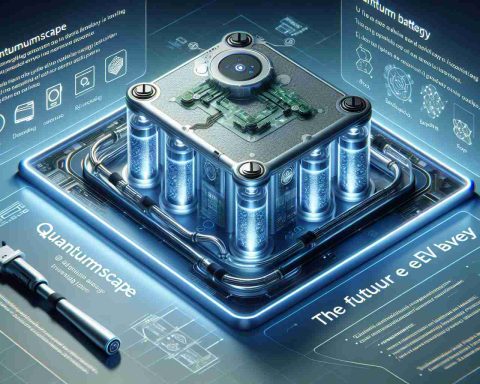—
The electric vehicle (EV) scene in the UK is quietly undergoing a seismic shift, courtesy of an innovative collaboration between recycling pioneer Altilium and chemical giant HELM AG. The duo is set to radically transform the lithium supply landscape by advancing a sustainable, homegrown recycling initiative that may fundamentally alter global dependencies.
—
Reimagining Lithium’s Journey
Lithium, considered the lifeblood of EV batteries, has traditionally journeyed thousands of miles, primarily processed in China under environmentally and geopolitically taxing conditions. This new UK initiative flips the script by focusing on lithium recovery domestically from retired EV batteries, a game-changer in reducing imports.
Altilium’s cutting-edge facility in Devon will lead this charge, efficiently extracting usable lithium that HELM AG will assess for potential strategic agreements. Such a localized effort not only promises a consistent supply but also addresses pressing ecological concerns.
—
Environmental and Economic Ripple Effects
The environmental benefits of this recycling model are monumental. Unlike traditional mining, which often wreaks havoc on ecosystems, this approach seeks to minimize damage by reusing existing resources. As Altilium prepares to recycle materials from over 150,000 EVs annually, they could meet 20% of the UK’s lithium needs by 2030 while drastically decreasing waste.
Moreover, this sustainable route is expected to bolster the economy. By investing in local talent and infrastructure, the initiative anticipates an uplift in employment and technological innovation, setting a benchmark for responsible industrial practices worldwide.
—
Marching Towards an Equitable Tomorrow
As the world grapples with the dual challenges of energy demand and climate change, initiatives like that of Altilium and HELM AG underscore a crucial paradigm shift. The UK is not just responding to immediate lithium needs but also crafting a vision for an eco-friendly and socially responsible future, potentially inspiring other countries to rethink their resources management strategies.
Reimagining Lithium’s Journey
The partnership between Altilium and HELM AG to recycle lithium in the UK represents a pivotal change with significant implications for the environment, humanity, and the global economy. This initiative marks a departure from the traditional lithium supply chain, involving long-distance shipping and environmentally damaging practices, to a more sustainable and localized model that could reshape the future landscape of the electric vehicle (EV) industry.
Environmental Impact
Lithium mining has long been criticized for its detrimental impact on ecosystems, often leading to water pollution, habitat destruction, and significant carbon emissions from global transportation. By focusing on recovering lithium from decommissioned EV batteries, the Altilium and HELM AG initiative offers a more sustainable alternative that reduces dependency on new extraction. This recycling model lowers the ecological footprint of lithium production, addressing pressing environmental concerns like waste reduction and resource conservation. By minimizing the need for further mining activities, this initiative contributes to preserving biodiversity and protecting natural habitats.
Economic Impact
Economically, this innovative collaboration promises to foster growth and sustainability. With plans to recycle lithium from approximately 150,000 EVs annually, the initiative could supply 20% of the UK’s lithium needs by 2030. This reliable domestic supply reduces dependency on volatile international markets and potentially insulates the UK economy from geopolitical tensions that can disrupt supply chains. Furthermore, investing in local recycling facilities creates jobs and encourages economic development, stimulating technological innovation and positioning the UK as a leader in sustainable industry practices.
Future of Humanity
The shift towards sustainable lithium recycling reflects a broader movement towards responsible resource management and green technology. As the demand for electric vehicles continues to rise, the importance of sustainable battery production becomes even more critical. Initiatives like Altilium’s and HELM AG’s set a precedent for the global transition to a circular economy, where reuse and recycling become standard practices. This movement can drive global efforts to combat climate change and promote environmental stewardship, paving the way for a greener and more equitable future for humanity.
On a global scale, adopting such sustainable practices can inspire other nations to rethink their resource management strategies, encouraging collaboration and innovation in clean technology. As we move towards a future where energy demand and environmental conservation must be balanced, initiatives like this highlight the potential for industry transformation that aligns with ecological and social values. By localizing and greening supply chains, we take a vital step towards achieving a sustainable energy future that benefits both people and the planet.
UK’s Seismic Lithium Revolution: Redefining the Electric Vehicle Landscape
Unveiling the Future of Domestic Lithium Supply
In a groundbreaking move poised to reshape the electric vehicle (EV) industry, the UK stands on the brink of a lithium revolution thanks to a pioneering alliance between recycling expert Altilium and chemical industry leader HELM AG. This collaboration aims to overhaul the lithium supply chain, emphasizing sustainability and local sourcing, potentially setting a global precedent.
Features of the UK Lithium Recycling Initiative
The collaboration between Altilium and HELM AG focuses on a key innovation: domestic lithium recovery from retired EV batteries. This initiative marks a shift from the traditional norm of lithium importation and processing, largely dominated by China. By establishing a cutting-edge recycling facility in Devon, Altilium sets a new benchmark in reducing the carbon footprint associated with lithium’s lengthy journey across continents.
– Local Recycling Facility: Altilium’s facility in Devon is designed to handle lithium recovery efficiently, providing a consistent supply independent of international market fluctuations.
– Partnership with HELM AG: HELM AG’s role involves assessing the recovered lithium for potential strategic agreements, ensuring high-quality supplies for further industrial use.
Environmental and Economic Advantages
This recycling strategy not only addresses pressing environmental issues but also proposes significant economic benefits. By focusing on lithium recovery from existing materials, the initiative reduces the need for environmentally damaging mining practices, providing a more sustainable source of this crucial element.
– Environmental Impact: The recycling initiative is expected to significantly reduce the ecological degradation associated with lithium mining, marking a monumental stride towards sustainable practices.
– Economic Growth: With projections to recycle materials from over 150,000 EVs annually, the initiative is poised to meet a substantial portion of the UK’s lithium demand by 2030. This also translates into increased local employment and infrastructure development, spearheading technological innovation.
Addressing Global Challenges
As global demand for energy solutions heightens alongside climate change concerns, the UK’s shift towards domestic lithium recycling through the Altilium and HELM AG partnership offers a viable blueprint for sustainable progress. This initiative not only meets the immediate supply needs but also proposes a long-term, eco-friendly vision that can inspire international resources management reforms.
For more information on sustainable initiatives and technological innovations, visit Altilium and HELM AG.












